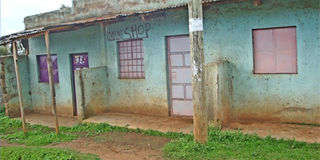Be careful not to invest in a white elephant

Abandoned business premises like this one are common in rural areas. PHOTO| PAUL KARIUKI.
What you need to know:
- Some of the houses turn into white elephant or half-complete projects that end up being occupied by family members for free.
- Cases of huge houses being put up in rural areas for prestige are becoming the new norm.
There is a notable trend in many rural areas, where people have put up houses either for residential or commercial purposes, but which end up lying idle for a long time.
These are pointless capital investments since they generate no returns. Also, some people working in urban areas build residential homes but occupy them only occasionally.
Consequently, some of the houses turn into white elephant or half-complete projects that end up being occupied by family members for free.
The demand for housing is not very high in many rural areas. And because of close family bonds, several family units can live in one compound, so there is rarely ever a need for a member to seek accommodation elsewhere.
Commercial rental units deep in the village record much lower occupancy than, say, those next to highways or key feeder roads.
Mr Richard Nyakundi, who deals in real estate, says: “In rural areas, you will note that most people live in their own homes and there are no economic factors like industries that can attract people the local area. The result is little movement, so it is no wonder many premises have low occupancies,” he says.
He notes that it doesn’t make sense to build a structure in a rural area just to please others. “There are certain expectations from communities for family members, especially sons, to build houses in their rural homes, which, from an economic perspective, does not make sense since some of these houses are rarely occupied,” he says.
Cases of huge houses being put up in rural areas for prestige are becoming the new norm. But often, such houses are either unoccupied or left in the hands of caretakers, or occupied by close relatives of the owners, who might be even be living abroad.
And should the owner decide to rent it out, they have a hard time getting a tenant, meaning little to no returns on the investment.
Mr John Njoroge, a pharmacist and an investor in real estate, has invested in commercial rental premises in his rural village of Nakuru but none of his eight double rooms is currently occupied. Although they are strategically located, he had found it hard to get tenants since potential tenants want them for residential purposes.
“The aim was to turn the place into a commercial business hub rather than a residential one. I intend to use three of the units for my own business soon,” he says.
He notes that most rural people have little economic muscle to invest in high income- generating ventures that would require large operating spaces.
A mama mboga looking to expand that little roadside stall by diversifying into cereals would likely move to a place where her stock will move fast than stagnate in a place where the rent and utility bills are equal to her monthly income.
Ms Rebecca Wairimu, who makes and sells cushions, once operated in a commercial building but did not get customers. “It was difficult operating from a building so I decided the best to get customers was to find them by hawking my wares,” she says.





